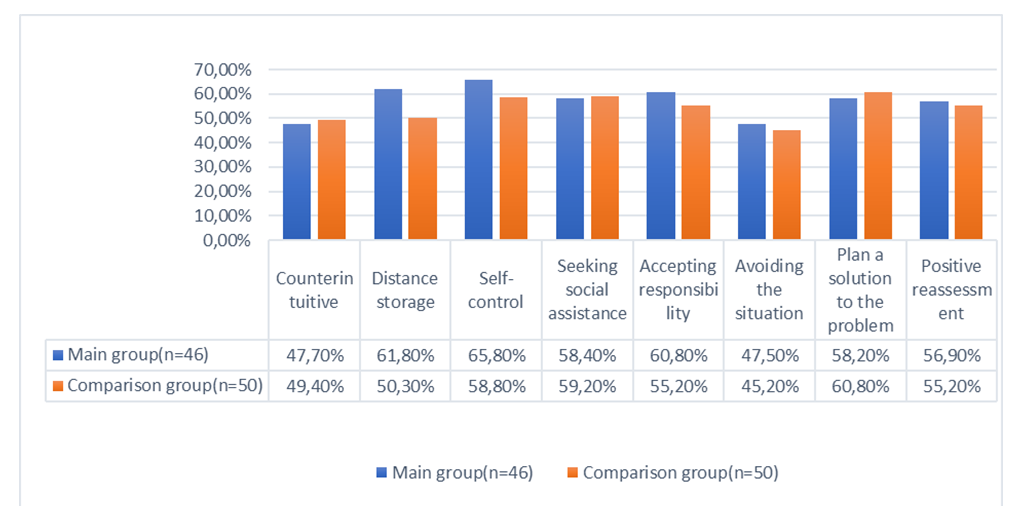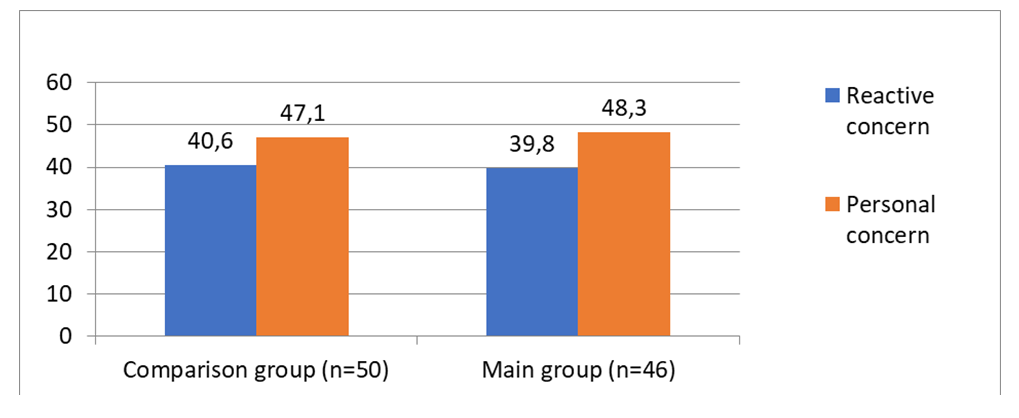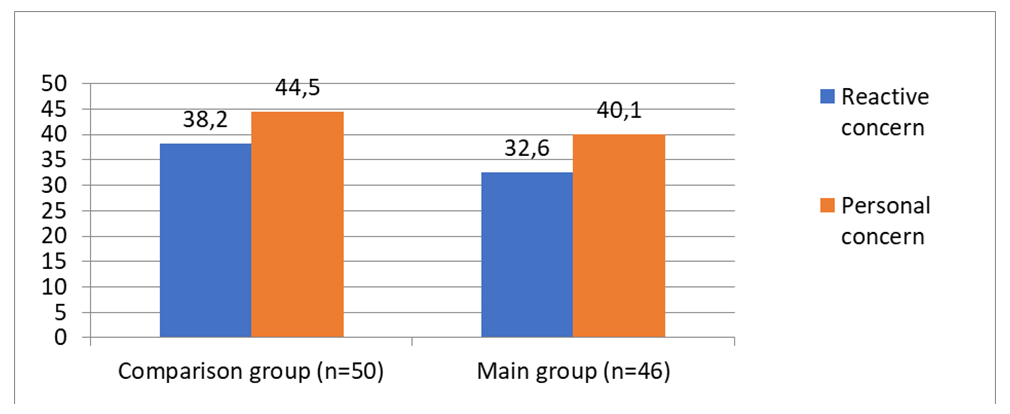-
Paper Information
- Next Paper
- Previous Paper
- Paper Submission
-
Journal Information
- About This Journal
- Editorial Board
- Current Issue
- Archive
- Author Guidelines
- Contact Us
American Journal of Medicine and Medical Sciences
p-ISSN: 2165-901X e-ISSN: 2165-9036
2024; 14(4): 858-862
doi:10.5923/j.ajmms.20241404.12
Received: Mar. 1, 2024; Accepted: Mar. 28, 2024; Published: Apr. 2, 2024

Anxiety-Depression in Cardiovascular Diseases Psychocorrection of Disorders
V. K. Abdullayeva1, B. B. Safarbayev2, S. K. Kurbonboyev2, R. O. Palvanov2
1Tashkent Pediatric Medical Institute, Tashkent, Uzbekistan
2Urganch Branch of Tashkent Medical Academy, Urgench, Uzbekistan
Copyright © 2024 The Author(s). Published by Scientific & Academic Publishing.
This work is licensed under the Creative Commons Attribution International License (CC BY).
http://creativecommons.org/licenses/by/4.0/

The article presents scientific data and analysis of our researches on psychological characteristics of patients with cardiovascular diseases, identification of defense-coping behavior and optimization of psychotherapeutic tactics. The use of cognitive-behavioral psychotherapy and music therapy, aimed at correcting the cognitive and behavioral content of strategies for coping with stressful life situations associated with a specific personality typology and form of psychopathological disorder, made it possible to increase the effectiveness of therapeutic measures for patients suffering from cardiovascular disease.
Keywords: Defense-coping behavior, Psychotherapy, Cardiovascular diseases, Anxiety-depressive disorder
Cite this paper: V. K. Abdullayeva, B. B. Safarbayev, S. K. Kurbonboyev, R. O. Palvanov, Anxiety-Depression in Cardiovascular Diseases Psychocorrection of Disorders, American Journal of Medicine and Medical Sciences, Vol. 14 No. 4, 2024, pp. 858-862. doi: 10.5923/j.ajmms.20241404.12.
Article Outline
1. Introduction
- According to WHO, cardiovascular diseases are one of the main causes of death worldwide [3,11]. In medical psychology, hypertension and ischemic heart disease are considered classic psychosomatic diseases. In this regard, patient care should have a comprehensive medical-psychological nature and a person-oriented orientation [12]. For this, it is necessary to take into account the psychological factors of the response to the disease state. Personal attitude to the disease, vital-biological, professional-labor, social-psychological and individual-psychological approach depends on meanings [13,14]. Many studies show that patients are more prone to the development of affective disorders for a number of reasons [6,15], and affective disorders are detected in 64% - 80% of cases, respectively, in patients with cardiovascular diseases. At the same time, the level of comorbidity of these cases reaches 70% [5,8]. The observation of anxiety-depressive disorders in cardiovascular diseases determines the important role of psychotherapy in the complex treatment of this pathology. [7]. For this reason, stress coping strategies can be points of application of psychotherapeutic influence; determining the onset of the disease and the development of neurotic "layers", elements of the patient's relational system; patient's social activities, re-adaptation to family and society; increases the effectiveness of therapeutic effects of biological nature [2,9]. The interaction between the personality-typological characteristics of patients with psychosomatic disorders and their stress coping strategies, and the search for optimal therapeutic goals to determine the extent of psychotherapeutic assistance to these patients in inpatient settings, remains relevant. [1,4,10]. In this regard, it is important to develop and implement effective psychotherapeutic approaches based on the study of clinical-psychological and individual-personal parameters of patients with cardiovascular diseases, and to determine their strategies for overcoming stressful situations that occur during the formation of psychosomatic diseases. is enough. Such approaches have a positive effect not only on the treatment of the disease, but also on its prognosis, which helps to improve the quality of life as an integral indicator of human health.The purpose of the study isoptimization of psychotherapeutic tactics in anxiety-depressive disorders of patients with cardiovascular disease.
2. Materials and Research Methods
- 96 patients with cardiovascular disease were examined. 44 of them were diagnosed with hypertension of the I and II degrees, 52 with ischemic heart disease (stress angina), and affective disorders were also identified. Among them, the number of men was 41 (43.0%), and the number of women was 55 (57.0%). The average age of men was 51.8±0.88, and that of women was 53.3±0.64. The age range of the examined patients was from 37 to 60 years. We diagnosed these patients with the following affective disorders: 40 (41.7%) patients had a mild depressive episode (F32.0), 56 (58.3%) patients had a mixed anxiety-depressive disorder (F41.2). These patients included in the study were randomly divided into 2 identical groups. The main group consisted of 46 patients treated with standard cardiology therapy, psychotherapy and psychopharmacotherapy. The comparison group consisted of 50 people, whose treatment was carried out using psychopharmacotherapy in accordance with therapeutic standards and without the use of psychotherapeutic correction. The groups were compared clinically and socio-demographically. Grouping was based on the following criteria: presence of mixed anxiety-depressive disorder [F41.2] or mild depressive episode [F32.0] as determined by clinical examination. Difficulty examining patients for research; Individuals suffering from severe somatic pathology, as well as those with severe mental pathology symptoms that make learning difficult, are not included: organic mental illness (F00-F09 according to ICD-10), endogenous psychosis (F20-F29), psychoactive substance abuse These include mental and behavioral disorders (F10-F19), mental retardation (F70-F79) due to substance abuse. During examination of patients, somatic condition was assessed, psychological indicators were studied. Clinical and psychological examination included the following tests: Leongard-Shmishek questionnaire, Spielberger-Hanin's reactive and personal anxiety scale, R. Lazarus' "coping strategy" questionnaire, hospital scale of anxiety and depression.
3. Discussion and Results
- At the first stage before the treatment, the patients underwent a clinical and psychological examination, which allowed to obtain the following information. Patients in the examined group were characterized by high personal anxiety and moderate reactive anxiety. R. Lazarus's "coping strategy" questionnaire revealed that the leading strategies for coping with stress were "self-management", "seeking social support", "planning a problem solution" in both groups, with a high level of intensity. (Figure 1).
 | Figure 1. Coping strategies of patients examined before treatment |
 | Figure 2. Reactive and subjective anxiety scores before treatment |
 | Figure 3. Reactive and personal anxiety scores after treatment |
4. Conclusions
- Clinical and psychological characteristics of patients with anxiety-depressive disorders in cardiovascular diseases, high level of reactive and personal anxiety are characterized by significant psycho-emotional stressful situations. A high level of intensity of the leading strategies for coping with stress was related to these parameters, including "self-management", "seeking social support", "planning a problem solution" in both groups. adaptive coping strategies in the form of "avoidance of the situation", "keeping a distance" and "positive reappraisal" inflexible coping strategies were noted. The selection of leading strategies for coping with stress in patients with anxiety-depressive disorders reveals that there is a certain connection with the main personality-typological characteristics of these patients. Anxious-suspicious, restless and emotionally-labile individuals prefer the "social support-seeking" strategy. Authoritative individuals use the coping strategy of "self-management". Individuals with dysthymic accentuation, on the other hand, choose the strategies of "keeping a distance" and "avoiding the situation". Women's goal-directed behavior is carried out by choosing the "social support-seeking" strategy, and men's "self-management" strategy. Psychocorrection of each patient's individual coping strategy with the help of optimized cognitive-behavioral psychotherapy and music therapy in patients with anxiety-depressive disorder in cardiovascular disease led to an increase in the effectiveness of therapeutic processes.
 Abstract
Abstract Reference
Reference Full-Text PDF
Full-Text PDF Full-text HTML
Full-text HTML